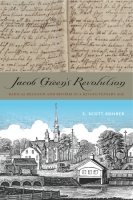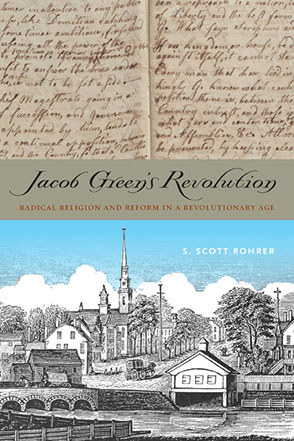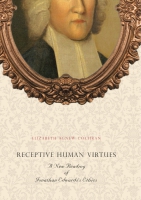Jacob Green’s Revolution
Radical Religion and Reform in a Revolutionary Age
S. Scott Rohrer
“In this well-written and well-argued book, Rohrer has made a generous contribution to prevailing understandings of religion in revolutionary America. Others have corrected previous interpreters by showing that republican political ideology shared common ideas with Puritan covenant theology, Calvinism, and evangelicalism. But Rohrer has made one of the most persuasive cases yet in his richly textured narratives of Green and Chandler. This book is a must read for anyone who hopes to understand the complex relationships between Christianity and the American Revolution.”
- Media
- Description
- Reviews
- Bio
- Table of Contents
- Sample Chapters
- Subjects
Read an interview with Scott Rohrer on The Way of Improvement Leads Home. You can also visit his personal web site at scottrohrer.net.
“In this well-written and well-argued book, Rohrer has made a generous contribution to prevailing understandings of religion in revolutionary America. Others have corrected previous interpreters by showing that republican political ideology shared common ideas with Puritan covenant theology, Calvinism, and evangelicalism. But Rohrer has made one of the most persuasive cases yet in his richly textured narratives of Green and Chandler. This book is a must read for anyone who hopes to understand the complex relationships between Christianity and the American Revolution.”
“This is a fine study that profits much from its design as a study in contrast of two radicals; its intelligent structure sharpens the author’s analysis of the nature of opposed religious believers, social concepts and political views.”
“An important contribution to the literature on the American founding. It should be widely read, particularly by those who have primarily seen the founding through the lives and works of a handful of Anglican elites.”
“Jacob Green, an independent-minded Presbyterian minister, played a leading role in New Jersey during the tumultuous days of the American Revolution. S. Scott Rohrer's innovative biography rescues this intriguing figure from unwarranted obscurity. In so doing, it also illuminates the strong (but complicated) connections between religion and politics at the dawn of the American nation. Rohrer's attention to the closely related biography of a loyalist Episcopalian (Thomas Bradbury Chandler) only sharpens the portrait of Green that stands at the heart of this fine study.”
“There is no more intriguing character among the American Revolution's pastors than Jacob Green, a fervent patriot, antislavery advocate, and principled Calvinist. S. Scott Rohrer brings Green's story to life in this much-needed biography, with its admirable combination of lucid writing and historical insight.”
“Rohrer has produced an excellent, concise study of one middle-colony Presbyterian minister whose New Light Calvinism deeply informed his libertarian and egalitarian inclinations as the imperial argument between Britain and its American colonies erupted into revolution in the 1770s.”
“Jacob Green’s Revolution provides a good case study of how an early American intellectual dealt with the combined influences of Enlightenment thought and Calvinism at the time of the American Revolution.”
“This biography is a thought-provoking case study which can be used to introduce or illustrate the subject of religion at the time of the American Revolution. It succeeds in bringing the subject to life with direct, accessible prose.”
S. Scott Rohrer is an independent scholar.
Table of Contents
List of Illustrations
List of Tables
Preface
Introduction
Part One: The Worlds of Jacob Green and Thomas Bradbury Chandler
Chapter 1 Student
Chapter 2 Pastor
Chapter 3 Father
Chapter 4 Farmer-Miller-Physician-Teacher
Part Two: Revolutionary Thinkers and the Trials of War
Chapter 5 Polemicist
Chapter 6 Revolutionary
Chapter 7 Politician
Chapter 8 Host
Part Three: Reformers on the Home Front
Chapter 9 Crusader
Chapter 10 Dissenter
Chapter 11 Disciplinarian
Epilogue
Introduction
When it came to war on April 19, 1775, the fighting at Lexington Green and Concord was a clarion call for the dreamers and the reformers. At last the temporizing was ending, and committed revolutionaries saw their chance to fight for the changes in American society they believed the times demanded. Their ranks were diverse. At the top were the Whig intellectuals steeped in classical thought and the writings of British radicals like John Wilkes, men who dreamed of ending monarchical government and replacing it with a republican society populated by the virtuous. For them, the American Revolution was about self-rule and the chance to create independent governments, free of British meddling, that would solidify the elites’ wealth and power. At the bottom were the masses—the seamen, the laborers, the farmers, the African Americans, the “unruly”—who saw the war as a people’s revolution, a chance to establish democratic rights and create a more just society that would overthrow outdated institutions and redistribute political and economic power. For these legions of people, the Revolution was about creating a better, more prosperous life.
The sources of revolutionary energy were thus quite broad, and they were fed by streams flowing from vertiginous places. One such stream was from a particularly out-of-the-way place. In the Watchung Mountains of northwestern New Jersey, a backwoods reformer pursued a revolutionary program as ambitious as anything Thomas Paine could dream up. Yet he hardly fit the image of a revolutionary. He was unassuming and shy, and fairly old by the standards of revolution—fifty-three in 1775. Home was not the august halls of Williamsburg or the smoky parlor of a Boston tavern but a modest parish house in Hanover, New Jersey. He was not an erudite lawyer or an angry rioter but a quiet man of the cloth who preached discipline and obedience to God. Even after spending years in the pulpit as a Presbyterian minister, he was uncomfortable appearing before crowds of people and was an uninspiring public speaker. Bad nerves and bouts of melancholia undermined his health.
His pen, however, hinted at no such weakness, and this revolutionary brought to his task the penetrating eye of a critic who questioned not only British but American society. To an official in London reading his influential 1776 tract advocating independence, he was a troublemaker and a radical. To a slave owner in the Mid-Atlantic perusing his letters on liberty advocating a just society and denouncing slavery, he was a menace to good order. Jacob Green, a radical? He would have denied such a thing. When elected to the New Jersey Provincial Congress in May 1776, he went reluctantly and resigned his post within six weeks, as soon as decorum allowed. He scurried home to Hanover, to his library and his pulpit.
Jacob Green’s concerns were wider than taxation and representation (although, as a good Whig, he was concerned with both those things). Green wanted the rebelling Americans to abolish slavery, broaden democratic rights, reform the currency, and establish a fairer, almost communistic economic system that would give the downtrodden a fighting chance to succeed against the wellborn. Most ambitiously, he wanted a society that would be defined not by materialism and self-interest but by devotion to God and the common good. And he saw the American Revolution as his chance to achieve these ambitious goals, despite the numerous failings of the American people that he perceived and publicly lamented. In pursuing such a broad and idealistic reform agenda, Jacob Green was hardly alone; the American Revolution, as is well-known, produced its share of dreamers throughout the thirteen colonies.
The particularly interesting fact about Green’s reform drive, as this book will fully explore, was its source: it stemmed not from Whig philosophy or Lockean principles—the famous “contagion of liberty” that inspired so many colonists to revolt—but from his religious beliefs, specifically his Calvinism and the tenets he derived from the complex thought of Jonathan Edwards. Under assault from many quarters (including Enlightenment scientists and rationalists), Calvinism was a tired and harried religious movement by 1776, with many contemporaries seeing it as a barrier to reform and the improvement of society. Founded in the sixteenth century by John Calvin (1509–1564) during the early days of the Protestant Reformation, Calvinism dominated the intellectual thought of western Europe for the next three centuries, a domination resting on the simplest of premises—God preordained who was saved and who was not. In their rejection of Catholic conceptions of good works, indulgences, and purgatory, Calvin’s predestinarian teachings built on the insights of Augustine and Luther. Protestant reformers of the sixteenth century maintained that humans were incapable of lifting themselves up from their fallen states through acts of charity and good works. They especially rejected the idea that someone could “buy” salvation through timely gifts to the church. The definitive statement on this heretical notion came from the great Protestant reformer Martin Luther: under his justification by faith, God grants salvation to those who believe. Calvin’s followers then pushed the implication of Luther’s theory to its logical extreme: God alone does the granting—good behavior cannot earn someone salvation; a person cannot “work” his or her way to eternal bliss. Moreover, in this Calvinistic schemata, an all-powerful God can see far into the future and know ahead of time what will happen because he has preordained the course of events, including who will be saved and who will be damned.
From the beginning, Calvin’s teachings on predestination had their critics, who recoiled against the doctrine’s inherent cruelty: God decides ahead of time who will not be saved, and there’s nothing a person can do to keep from spending eternity in hell? One such critic was Henry VIII, the philandering English king who broke away from Rome in the late 1530s and anointed himself head of his country’s church. Under Calvinism, Henry wondered, where was the incentive to do good—to pursue reforms that would benefit society? Why should anyone behave morally and justly if good behavior did not matter? If bad behavior were preordained? While Henry agreed with Luther and Calvin that the Catholic Church had become a corrupt institution and that indulgences were wrong, he felt the reformers had gone too far in the other direction by seemingly dismissing all acts of charity. In Henry’s mind, salvation would be determined only after a final accounting at the Day of Judgment when a person dies.
Richard Hooker (1554–1600), the renowned English theologian during Queen Elizabeth’s reign, expounded on Henry’s critique: telling someone that her fate was determined before she was born and that she must follow the path laid out by God dampened the motivation for individuals to act morally. Hooker argued, instead, that reason was a gift of God, as was free will. It was up to individuals whether they wanted to do good, or bad—whether they wanted to spend their time in taverns or helping to feed and clothe the hungry and the homeless. Like Henry VIII, Hooker believed that good works played an important role in human society, and he constructed a comprehensive theological system built on reason and order that allowed for a far larger scope of human choice and action than Calvinism supposedly allowed.
These challenges, which in essence called into question whether Calvinism could be an agent for the reform of individuals and ultimately society, were only the beginning. Scientists during the Enlightenment were chipping away at Calvinism from another direction by slowly unraveling the mysteries of nature and the cosmos, thanks to, among other things, the invention of the microscope and the telescope. Scientists’ discoveries were raising uncomfortable questions about both the Bible and God’s powers. Was the Bible really an accurate accounting of human history? How do you explain its inconsistencies? Did God really control all? Or was free will paramount? Was God’s divine power behind the workings of nature, or were other forces responsible? The spirit of scientific inquiry brought a new, Baconian way of thinking that challenged researchers to analyze phenomena—and the Bible—based on evidence and observation, not on blind faith. The resulting skepticism brought renewed scrutiny to a sixteenth-century religious coda resting on the doctrine of predestination, and this skepticism produced what Peter J. Thuesen, a historian of Jonathan Edwards’s thought, terms Enlightenment latitude—“a new skepticism [after 1725] about rigid orthodoxies and a growing indifference toward old doctrinal confidence.” One result of this Enlightenment latitude was “a growing confidence in human ability and [it] entailed a strong interest in natural religion.” Deists exemplified the new skepticism most forcefully: God created the universe, they said, but he then sat back and watched his handiwork unfold. It was up to man to act, and it was man who was responsible for his actions—not his creator.
Thus, to its contemporary critics, Calvinism was a dour philosophy that stifled human initiative—and ultimately dampened the reform drive in human society. Some modern historians looking at the religious underpinnings of the American Revolution have seen Calvinism in the same light. In Bernard Bailyn’s telling, enlightened Whig thinkers “felt that it was precisely the heavy crust of custom that was weighing down the spirit of man; they sought to throw it off [during the American Revolution] and to create by the unfettered power of reason a framework of institutions superior to the accidental inheritance of the past.” At the opposite end of these forward-looking, enlightened Whigs of the 1770s were “covenant theologians”—Calvinists and Puritans—who “contin[ued] to assume the ultimate inability of man to improve his condition by his own powers.” For Nathan O. Hatch, the great energy unleashed by the Revolution came from evangelical upstarts like the Baptists and the Methodists; ministers who “clung to an undiluted Edwardsean theology, the authority of ordained clergymen, and the necessity of church discipline” were out of step with the emerging democratic ethos. Calvinism, in other words, was an intellectual shackle that kept its practitioners from embracing both the scientific advances of the age and the revolutionary opportunities afforded by the crisis with Great Britain.
Adherents of Calvinism mounted a vigorous defense through the years, and this counteroffensive began with Calvin himself. While conceding that predestination could be seen as cruel and uncaring, he asserted that the doctrine was nevertheless indisputable because of God’s unlimited power and majesty. “No one can deny,” Calvin wrote, “that God foreknew the future final fate of man before He created him, and that He foreknew it because it was appointed by His own decree.” God was sovereign, Calvin reminded his followers, and man was utterly and completely dependent on him. The “elect” could look forward to salvation; the “reprobates” to eternal flames. Such an answer certainly did not quiet Calvin’s critics, and legions of theologians took up the task of defending Calvinism’s conception of God’s power. One of the most prolix was English writer William Prynne, who reiterated in 1629 “that God from eternity hath freely of his own accord, chosen out of mankinde a certaine select number of men, which can neither be augmented nor diminished; whom he doth effectually call, save, and bring to glory.”
More ambitiously, others denied that Calvinism ignored good works and reform. One English sermon delivered in 1592 maintained “that whether a man be predestinate or no, yet he should live so much as may be in a holy obedience . . . for he that hath that hope that he is one of God’s sons doth purify himself, and being a vessel of honor must keep himself fair and clear for the use of his Master, being sanctified and prepared unto every good work.” A 1579 catechism that was included with the English version of the Geneva Bible provided an even clearer answer to the question of why, under predestination, anyone should do good: “Good work is a testimony of the spirit of God, which is given to the elect only.” In other words, performing good works was a way to show the world that you were not a reprobate, that you were, indeed, one of the chosen. This insight became a key tenet of faith for generations of Calvinists—from parliamentarians in 1620s England to Congregationalists in 1740s Massachusetts. Calvinism, they insisted, did not dampen moral behavior; it encouraged it.
Also of Interest
Mailing List
Subscribe to our mailing list and be notified about new titles, journals and catalogs.





